The new Showtime series, American Rust, has two-fold resonance for me. The episodes are released on a weekly basis, so at this point it’s hard to predict its arc, but the empty storefronts, crumbling steel mill, and desperate characters touch me and set up parallels I see and feel.
__________
Back in October of 1990, I was in Berlin. It was exactly one year after the fall of the Berlin Wall. October 3rd was designated German Reunification Day, the day East Germany (DDR) reunited with the Federal Republic of Germany. My wife and I lived in West Berlin during the ‘70s and early ‘80s, so it’s not surprising that we had tears in our eyes as we walked through the Brandenburg Gate where armed guards and barbed wire had, for all those years, kept us from crossing over to the East. That day, the crowd was immense. Total strangers were smiling, hugging, and giving high fives. It was euphoric but the beginning of a tough transition.
The next day we loaded our bikes on the U-Bahn, the WWII era subway that passes under both sides of the city. During the Cold War it still ran, but East Berlin stations were blocked. On October 4th we rode to the end of the line, not far from the Polish border, where we disembarked to begin our ride back.
It was late afternoon when we started. The October light was fading, and the euphoria of the day before had abated. It felt surreal. The landscape was from another time. As we rode, we passed through residential neighborhoods, saw abandoned factories, and as we approached the center of the city, row upon row of featureless Russian-style apartment blocs.
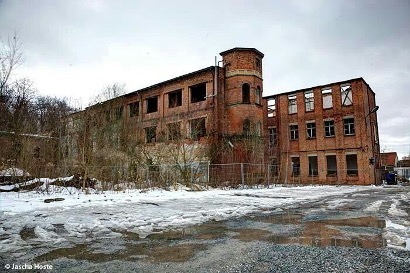
We hadn’t prepared for a night ride, but as dusk approached single yellow streetlights hanging from sagging wires were beginning to come on. I was reminded of The Third Man (1949) Orson Welles’ famous film noir. The dark cobblestone streets were bumpy, uneven, and empty. It was eerie after the excitement of Reunification Day. Eventually, the bright lights of West Berlin appeared on the horizon and we were back in our decade. I will always remember the excitement of Reunification Day, but the picture seared in my mind is how it looked and felt riding through the East the following afternoon.
All of this is coming back as we watch Showtime’s American Rust. The America pictured in the series is not much different from what we saw in East Berlin. Abandoned factories, empty storefronts, dilapidated trailer parks…and people left behind as their jobs and futures disappear. The Pennsylvania steel mill that provided good jobs is a rusting metaphor for their present day poverty and drug problems.
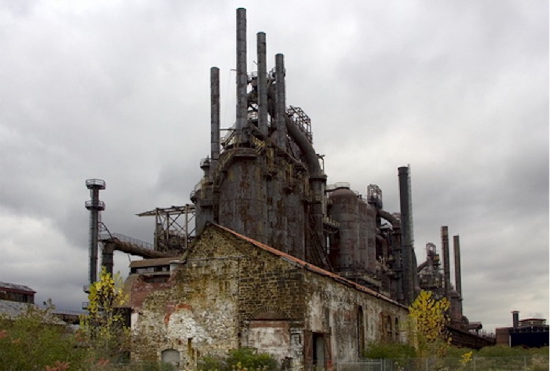
There is a scene in the first episode where Jeff Daniels, playing sheriff Del Harris, reminds an auctioneer from Pittsburgh, who’s come to town to foreclosure on a property, that “We’re a lot closer to West Virginia than we are to Pittsburgh.” In the background, a group of townies with guns standby, waiting for the auction. Sheriff Harris offers to escort the agent to the city limits and when the agent asks if he’s being run out of town the sheriff says, “No. Just making sure you have safe passage.”
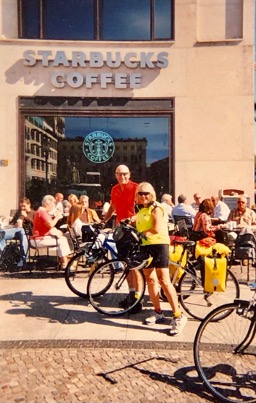
In 2007 Marilynn and I rode our bikes from Copenhagen to Berlin. Entering the city, we rode directly to the same Brandenburg Gate I had walked through on Reunification Day. Directly in front of us was a sign of the change. Starbucks now has pride of place in the heart of what was once the capital of East Germany.
Our ride from the ferry in Rostock to Berlin took us through the Mecklenburg region of what had been East Germany. It’s primarily agricultural land, but prior to reunification included manufacturing sites, now abandoned.
Today, the Baltic coast has a flourishing tourist trade, but the interior of Mecklenburg-Pomerania is depressed. The West German “miracle” it was promised never materialized. In recent years the region has become a center for Alternative fur Deutschland (AfD), the right wing, neo-Nazi party. Our 2007 ride happened to coincide with an election cycle, and we were stunned at the presence of its posters. The AfD was unsuccessful in that election, but elected 88 of the Bundestag’s 709 delegates last year. It’s not unlike disenfranchised voters rising up in the depressed areas of Ohio, Pennsylvania, and West Virginia.
American Rust is dark. It’s characters, including Sheriff Harris, are conflicted. Some are good. Some bad. Some caught in between. But their backstories are the abandoned steel mill, loss of jobs, family stresses, and opioid addiction that lead to an absence of hope. They are much the same as the citizens of Mecklenburg-Pomerania the end of the Cold War. Promises of prosperity never materialized after the tattered East German safety net was pulled out from under them. The right-wing AfD filled the void with new promises.
What happened in Washington on January 6, 2021 was not fiction. The election of 88 AfD Bundestag delegates was not fiction. The Big Lie is not fiction. I will be hanging on the unfolding fiction of American Rust until its conclusion (Episode 8) on October 31. Congress can mitigate the non-fiction problems of Appalachia and abandoned factories of the South and Midwest by passing the two infrastructure bills now before it. They are not silver bullets, but they will create jobs, repair failing roads and bridges, assist families, and plug holes in the American safety net. I’ve driven over America’s broken roads and bridges. I’ve seen its abandoned factories. I’ve watched Oregon vigilantes take the law in their own hands. I won’t be around when The Decline and Fall of the American Empire is written – but my grandchildren might be. If it is, I hope it’s fiction. My fingers are crossed.
Berlin photo courtesy of Jasche Hoste


























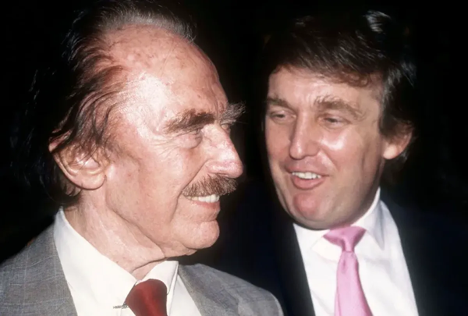


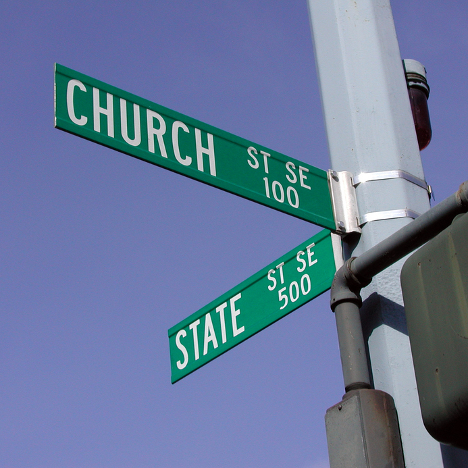
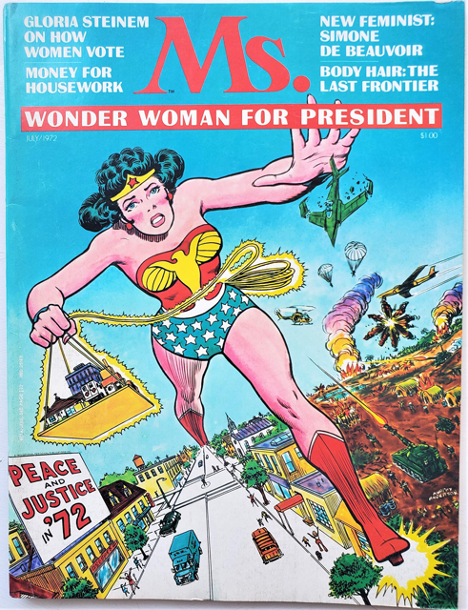

Our fingers are crossed as well!
I’m actually very sorry to say that I believe The Decline and Fall of the American Empire is already more than half written. The Baby Boomers and my generation, which didn’t even merit a catchy name, have no intention of giving up the power and wealth that they have amassed over the years. It doesn’t matter to them, that much of that power and wealth was achievable only through the repression of other races and cultures. Their explanation is simple. “I don’t discriminate against anyone and can’t be held responsible for the choices made by my ancestors”. It’s easy to say that while you sit on the wealth and power those policies gained you and your family. While it may be true that they don’t take any actions to openly discriminate, they also do nothing or actively campaign against any attempt to redistribute the wealth that their ancestors gained through corrupt practices. They will escalate this situation and when they can no longer maintain control through the government, they will rebel against it. Greed will be the undoing of every great human empire, and I will be very surprised if ours will be around for the entirety of my life.